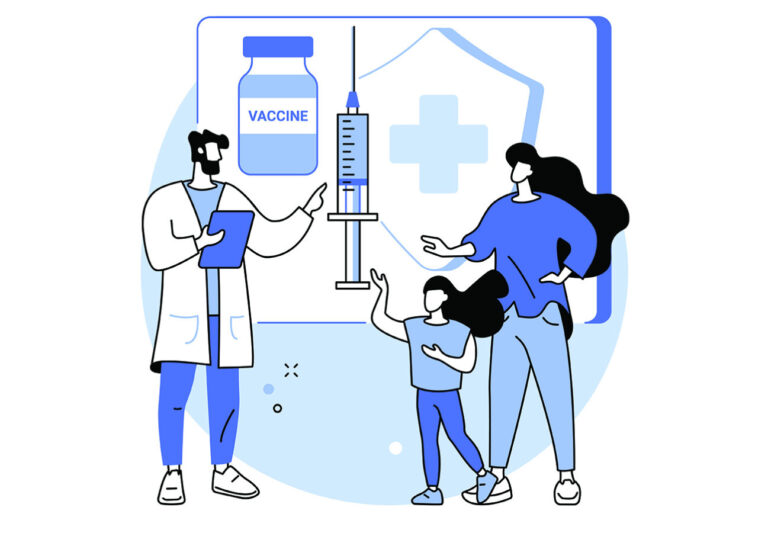Written by Ronny Bachrach
April encompasses Every Kid Healthy Week and World Immunization Week, signaling the perfect time to talk with our children about the importance of our health and well being. That often starts with our access to things like doctors, good nutrition, and the latest information on the best way to take care of ourselves – as well as our ability to protect ourselves and our community by means of vaccination.
This rings particularly true for me, as the pandemic and chronic illness has made it necessary to be more open and honest with my daughter about our health than I anticipated.
I always knew that I would have to explain my type 1 diabetes to my daughter. Day-to-day it’s a bit more granular, like, “I need some sugar to feel better” or reminding her that “I take a shot every time I eat food.” I like to communicate with her and help her try to understand what’s going on, while also keeping it simple enough for a four-year-old to comprehend. I’ve yet to be questioned about what exactly diabetes is, but I get more cursory questions about what my continuous glucose monitor is for and why am I getting a shot.
Covid-19 also opened the door for a lot of conversations about illness as well as personal responsibility and taking care of others. We talk about wearing masks and giving people space to be extra careful.
With my daughter Sam’s chronic illness, it’s an ongoing dialogue. Again, I like to be forthcoming as much as possible. I don’t like to hide any aspect of her illness or treatment. I try to make it digestible: “your medicine helps you to stay healthy,” “this medicine keeps you strong” or “this medicine helps take care of your belly.” We’re always open about which ones taste yucky and which ones aren’t so bad.
When we go to the infusion clinic, we talk about getting pokes for special medicine. When she gets imaging done, we talk about the importance of taking pictures inside her body to make sure she’s doing okay.
Children can be surprisingly receptive and perceptive. For Sam, she especially loves to see other kids taking medicine, getting pokes, and having pictures taken. I think it helps her to understand the importance of what she’s doing, and also helps her understand that she’s not alone.
I find using children’s books and shows to be an enormous help. They do the heavy lifting by providing age-appropriate language and content for you. Sam especially loves books about hospital environments, mask-wearing, and getting pokes.
Here are a few I recommend:
- Mommy Beeps by Kim Baillieul: A book for children who love a type 1 diabetic https://a.co/d/5cnjMEq
- Heroes Wear Masks: Elmo’s Super Adventure (a return back to school mask book for kids) (Sesame Street Scribbles) https://a.co/d/am4SyuD
- Curious George Goes to the Hospital by Margret Rey and H. A. Rey: a children’s picture book https://a.co/d/2RDO5Uz
- Get Well Soon!: A Sweet Feel Better Picture Book for Kids with Grover and Elmo (Sesame Street Scribbles) https://a.co/d/9soknLi
Another helpful tool is Toca Life: Hospital, a cool app that lets kids explore hospitals. They can go anywhere inside and touch and move everything, like medical tools, people, and even an ambulance.
Bottom line, kids are more receptive and tend to understand more than we often give them credit for. Don’t shy away from being direct and upfront about the information you’d like to share, while being mindful of sensitivities.


